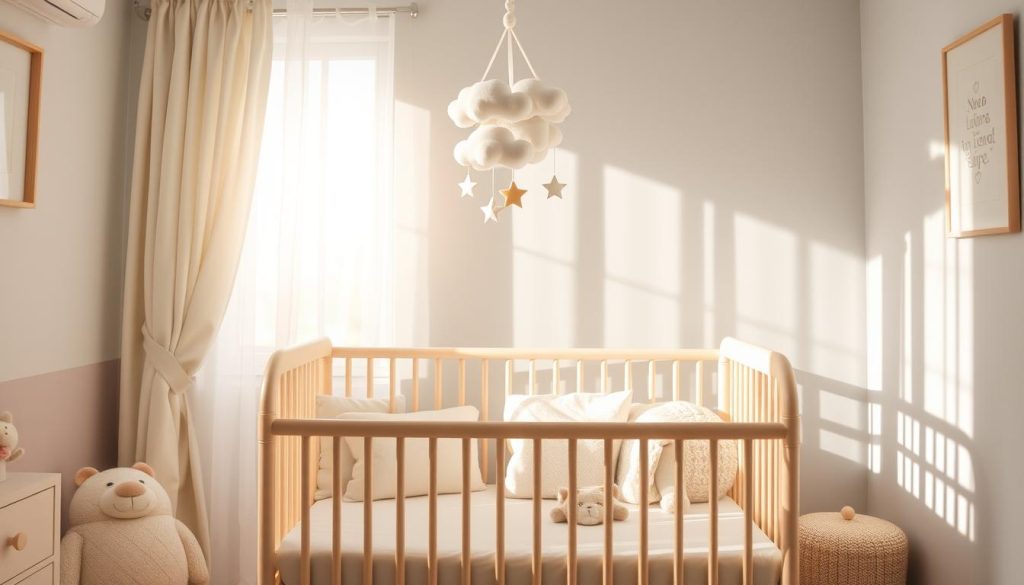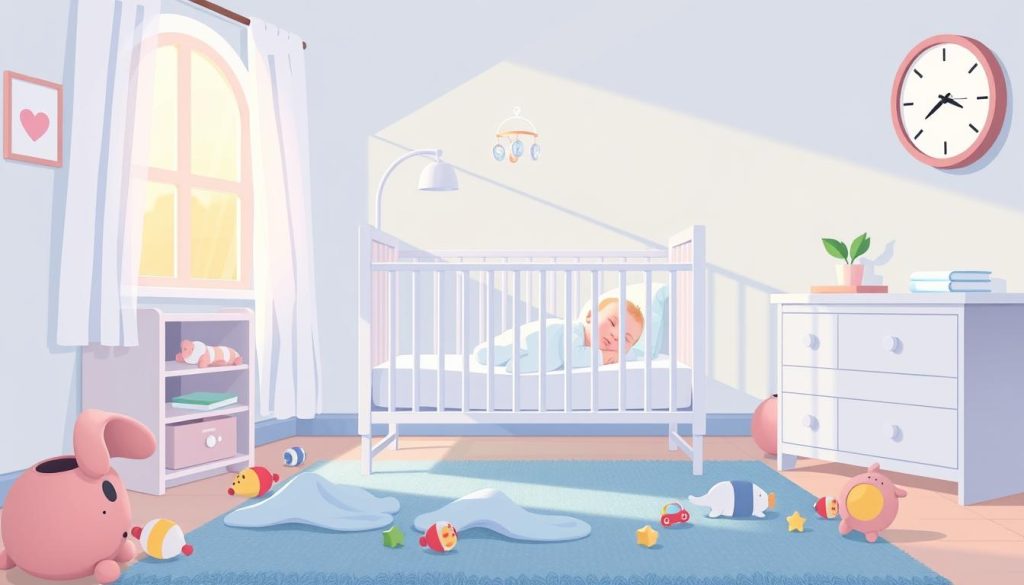Every parent faces the challenge of baby napping. When babies have trouble sleeping during the day, it’s tough for them and their caregivers. Not enough nap time can make a baby cranky and slow their growth. Knowing how to help a baby struggling with napping can make a significant difference in their mood and development.
Studies show that babies need good naps to grow well. This article provides parents with helpful tips to improve their baby’s nap time. The goal is to simplify the process for parents in helping their babies achieve restful sleep.
Key Takeaways
- Daytime naps play a vital role in supporting a baby’s overall growth and development.
- Inadequate napping can affect a baby’s mood and health.
- Understanding the reasons behind sleep struggles can aid in finding solutions.
- Creating the right sleep environment is key to successful napping.
- Establishing a consistent nap routine can improve sleep quality.
Understanding the Importance of Daytime Naps
Daytime naps are key for a baby’s growth and health. They help with thinking and feeling good. Knowing how naps help, parents can support their child’s sleep better.
Benefits of Napping for Babies
Napping has many benefits for babies. It helps with:
- Enhanced brain development: Sleep helps solidify memories and learning.
- Improved mood: Enough rest makes babies happier.
- Growth and healing: Sleep aids in physical growth and recovery.
- Long-term cognitive advantages: Regular naps improve focus and problem-solving skills.
The Recommended Sleep Duration
Knowing how long to nap is important for healthy sleep habits. The American Academy of Pediatrics gives guidelines. Here’s a guide for nap times by age:
| Age Range | Total Sleep (including naps) | Number of Naps | Recommended Nap Duration |
|---|---|---|---|
| Newborns (0-3 months) | 14-17 hours | 4-5 naps | 30-45 minutes |
| Infants (4-11 months) | 12-15 hours | 2-3 naps | 1-2 hours |
| Toddlers (1-2 years) | 11-14 hours | 1-2 naps | 1-3 hours |

Common Reasons a Baby is Struggling with Daytime Naps
Understanding why babies have trouble sleeping is key. Many things can make it hard for them to nap well, including too much stimulation, teething pain, and changes in sleep patterns as they grow. Knowing how to help a baby struggling with these issues can improve their nap quality.
Overstimulation and Fatigue
Babies can get too much from their surroundings. This makes it hard for them to relax and sleep. It’s important to know when a baby is too stimulated. Signs include being fussy and having trouble focusing.
Creating a quiet space can help a lot. It makes it easier for babies to calm down and sleep.
Teething and Discomfort
Teething can be very uncomfortable for babies. It can mess up their nap times. Look for signs like drooling or chewing a lot.
Softer toys or cold teething rings can help. They can make the baby feel better and help them sleep.
Developmental Milestones
Babies grow and learn new things, which changes their sleep. These big steps can affect how they nap. It’s important to be flexible during these times.

Creating an Ideal Sleep Environment for Daytime Naps
Creating a great sleep space for babies can help them nap better. It’s important to think about the temperature, lighting, and noise levels. Knowing how to help a baby struggling in their sleep environment is crucial. A well-set crib ensures babies sleep safely and comfortably.
Temperature and Lighting Considerations
The nursery’s temperature is key for baby sleep. It should be between 68-72°F for comfort. Soft lights help babies relax and sleep better.
Blackout curtains are great for blocking out too much light. This helps babies sleep deeper during naps.
Noise Level and Crib Setup
Keeping the noise down is important for a quiet nap space. White noise machines can cover up loud sounds. This makes the atmosphere calm.
The crib setup is also crucial. It should be safe and comfy. A firm mattress and the right sleep position are important. This makes the crib a cozy place for sleep.
Effective Techniques to Help Your Baby Nap Better
Creating a good baby nap routine needs smart strategies. It’s all about being consistent and using the right tools. This helps your baby nap better and sleep well.
Establishing a Consistent Nap Routine
A set nap routine makes your baby feel safe and comfortable. Reading or singing before naps tells your baby it’s time to sleep. This helps them feel secure.
Infants love routines because it helps them sleep better. Aim to take a nap at the same time each day. This helps them develop good sleep habits.
Using Sleep Aids and Soothing Techniques
Using sleep aids like swaddling and pacifiers can help your baby relax. Gentle rocking and white noise machines also help create a calm sleep environment. They block out loud noises.
But it’s crucial to avoid excessive use of these tools. In this way, your baby begins to develop the ability to fall asleep independently. It’s a step towards better sleep habits.
Conclusion
Overcoming nap challenges means knowing what affects a baby’s sleep. It’s all about creating an ideal sleep environment and following a consistent nap routine. This guide helps parents deal with the tough parts of baby sleep. Keep in mind, that staying patient and persevering is essential. As your baby gets older, they will need different things. Changing how you help them sleep is key to supporting them.
Even though sleep issues can be tough, they can be solved with the right effort. By focusing on how to help a baby struggling with sleep, you start a journey to better napping. This means both you and your baby can have peaceful, restful times together.
FAQ
What can I do if my baby struggles with daytime naps?
Try a consistent nap routine and a calm sleep area. Look for reasons like too much stimulation or teething pain. These steps can help your baby nap better.
What are the signs that my baby is overtired?
Look for fussiness, trouble settling, rubbing eyes, and short attention. Spotting these signs helps you plan naps to avoid overstimulation.
How can the sleep environment affect baby napping?
A good sleep spot is key. Keep it cool, dark, and quiet. Use white noise to block out sounds.
Should I use sleep aids to help my baby nap?
Sleep aids like swaddling or pacifiers can help relax your baby. But, avoid making them too dependent. Start slowly to help your baby nap on its own.
What role does teething play in a baby’s napping difficulties?
Teething can make your baby uncomfortable and fussy. Try teething rings, cold compresses, or gentle gum massage to ease their pain and help them sleep.
How does my baby’s developmental stage affect their naps?
As babies grow, their sleep needs change. They might start rolling, crawling, or walking. Adjust their nap routine as they grow and stay flexible.
